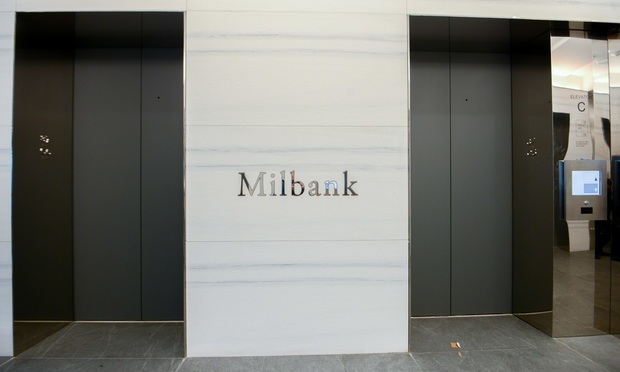Milbank, 'Not a Wall Street Firm Anymore,' Takes New Name
The renaming to simply "Milbank" coincides with a move from downtown to new offices at 55 Hudson Yards.
February 21, 2019 at 05:50 PM
4 minute read
 Milbank's new Hudson Yards offices (Photo: David Handschuh/NYLJ)
Milbank's new Hudson Yards offices (Photo: David Handschuh/NYLJ)
Milbank, Tweed, Hadley & McCloy, one of New York's oldest and most elite law firms, is now simply Milbank LLP.
The name change became legally effective Tuesday, on the same day the firm moved from downtown to its new office at 55 Hudson Yards. The firm had been downtown since its founding about 150 years ago. Milbank's shortened name is visible throughout its new offices.
“We are not a Wall Street firm,” said Scott Edelman, the firm's chairman, in an interview Thursday. “We are so much more than that.”
While many have referred to the firm as simply Milbank, the change in its legal name makes it official and marks another step, along with the Hudson Yards move, in Milbank's evolution from its downtown roots.
The new name refers only to founding partner Albert G. Milbank and drops three partners off the firm's letterhead: Harrison Tweed, Morris Hadley and John J. McCloy, who had perhaps one of the most prominent careers among New York lawyers.
While all the former name partners served on prominent boards and positions beyond the law firm, McCloy was among the most visible in New York legal circles, serving as a “lawyer, diplomat and adviser to seven presidents,” according to an archived history from the firm's website.
In 1952, according to the firm's chronology, after another stint in public service, McCloy became chairman of the financial institution that would under his leadership become The Chase Manhattan Bank. He rejoined Milbank in 1961 as of counsel, but was soon pressed back into public service by President John F. Kennedy to act as special assistant on disarmament, and by President Lyndon B. Johnson, who appointed him to the Warren Commission, which investigated Kennedy's assassination. When he returned as a general partner, the firm name became Milbank, Tweed, Hadley & McCloy.
While the firm is proud of its history and the partners' contributions, Edelman said, “it's been so long that they've been associated with the firm,” and there's “no connection with the lawyers here today and those names.”
Milbank for many years was thought of as a Wall Street firm focusing on banks, Edelman said, “and the words 'white-shoe' were associated with that.”
“That's not at all what the firm is focused on today,” he said, adding that the firm's business with banks accounts for a minority of its revenue. “I don't think of Milbank as a Wall Street firm anymore.”
“We're not trying to walk away from doing that work,” but Milbank also represents many other types of clients, he said.
The firm's new brand is a more accurate and contemporary reflection of what Milbank has become and its success, he said, adding the rebrand is a “tangible symbol” of Milbank now.
“We're quite diverse,” he said, noting the firm has work across Latin America, Asia and Europe. He said the firm has thriving transactional, litigation and restructuring departments, represents companies, hedge funds and private equity funds, and handles work in new industries, such as satellite technology.
Two Milbank partners who helped the firm rebrand, Christopher Gaspar and Paul Denaro, said the firm's partners voted unanimously on the name change several weeks ago. But the rebranding effort stretched over months.
Denaro said the firm has been referred to over the years as Milbank, Milbank Tweed, its full legal name or just MTHC. “The whole point is to get everyone back to a common denominator,” he said, “so that we could have a consistent message about who we are as a firm.”
With the firm's new brand, the partners wanted to “be reflective of our modern firm but also not to lose sight of the 153-year heritage,” Gaspar said.
Milbank is far from alone in rebranding and shortening its name lately. The moves come amid a wider trend in the legal industry toward more compact names and tighter brand identities. Boston-based Mintz, Levin, Cohn, Ferris, Glovsky and Popeo pared down to Mintz. Bartlit Beck Herman Palenchar & Scott formally changed its name to Bartlit Beck.
Milbank may be the first elite New York firm in recent memory to change its name, however. Several others in New York have remained committed to their longer names, and to the ampersands that bind them.
Read More:
This content has been archived. It is available through our partners, LexisNexis® and Bloomberg Law.
To view this content, please continue to their sites.
Not a Lexis Subscriber?
Subscribe Now
Not a Bloomberg Law Subscriber?
Subscribe Now
NOT FOR REPRINT
© 2025 ALM Global, LLC, All Rights Reserved. Request academic re-use from www.copyright.com. All other uses, submit a request to [email protected]. For more information visit Asset & Logo Licensing.
You Might Like
View All
Spotify GC Steps Down, Opts to 'Step Away From Full-Time Corporate Life'
2 minute read
Dechert Sues Former Attorney for Not Returning Compensation
Trending Stories
Who Got The Work
J. Brugh Lower of Gibbons has entered an appearance for industrial equipment supplier Devco Corporation in a pending trademark infringement lawsuit. The suit, accusing the defendant of selling knock-off Graco products, was filed Dec. 18 in New Jersey District Court by Rivkin Radler on behalf of Graco Inc. and Graco Minnesota. The case, assigned to U.S. District Judge Zahid N. Quraishi, is 3:24-cv-11294, Graco Inc. et al v. Devco Corporation.
Who Got The Work
Rebecca Maller-Stein and Kent A. Yalowitz of Arnold & Porter Kaye Scholer have entered their appearances for Hanaco Venture Capital and its executives, Lior Prosor and David Frankel, in a pending securities lawsuit. The action, filed on Dec. 24 in New York Southern District Court by Zell, Aron & Co. on behalf of Goldeneye Advisors, accuses the defendants of negligently and fraudulently managing the plaintiff's $1 million investment. The case, assigned to U.S. District Judge Vernon S. Broderick, is 1:24-cv-09918, Goldeneye Advisors, LLC v. Hanaco Venture Capital, Ltd. et al.
Who Got The Work
Attorneys from A&O Shearman has stepped in as defense counsel for Toronto-Dominion Bank and other defendants in a pending securities class action. The suit, filed Dec. 11 in New York Southern District Court by Bleichmar Fonti & Auld, accuses the defendants of concealing the bank's 'pervasive' deficiencies in regards to its compliance with the Bank Secrecy Act and the quality of its anti-money laundering controls. The case, assigned to U.S. District Judge Arun Subramanian, is 1:24-cv-09445, Gonzalez v. The Toronto-Dominion Bank et al.
Who Got The Work
Crown Castle International, a Pennsylvania company providing shared communications infrastructure, has turned to Luke D. Wolf of Gordon Rees Scully Mansukhani to fend off a pending breach-of-contract lawsuit. The court action, filed Nov. 25 in Michigan Eastern District Court by Hooper Hathaway PC on behalf of The Town Residences LLC, accuses Crown Castle of failing to transfer approximately $30,000 in utility payments from T-Mobile in breach of a roof-top lease and assignment agreement. The case, assigned to U.S. District Judge Susan K. Declercq, is 2:24-cv-13131, The Town Residences LLC v. T-Mobile US, Inc. et al.
Who Got The Work
Wilfred P. Coronato and Daniel M. Schwartz of McCarter & English have stepped in as defense counsel to Electrolux Home Products Inc. in a pending product liability lawsuit. The court action, filed Nov. 26 in New York Eastern District Court by Poulos Lopiccolo PC and Nagel Rice LLP on behalf of David Stern, alleges that the defendant's refrigerators’ drawers and shelving repeatedly break and fall apart within months after purchase. The case, assigned to U.S. District Judge Joan M. Azrack, is 2:24-cv-08204, Stern v. Electrolux Home Products, Inc.
Featured Firms
Law Offices of Gary Martin Hays & Associates, P.C.
(470) 294-1674
Law Offices of Mark E. Salomone
(857) 444-6468
Smith & Hassler
(713) 739-1250








